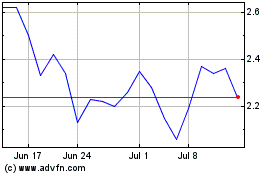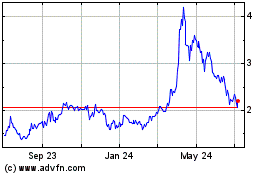Galectin Therapeutics Inc. (NASDAQ:GALT), the leading developer of
therapeutics that target galectin proteins, and the Earle A. Chiles
Research Institute, a division of the Providence Cancer Institute,
today announced top-line clinical data from the extension cohort of
an investigator-initiated Phase 1b clinical trial of Belapectin, a
galectin-3 inhibitor, in combination with KEYTRUDA® (pembrolizumab)
in patients with metastatic melanoma and head and neck cancer1. The
study is conducted under the direction of Dr. Brendan D. Curti,
M.D., a renowned cancer and melanoma expert2.
The extension study enrolled nine melanoma patients and five
head and neck squamous cell carcinoma cancer patients. Compared to
the initial phase 1b patients, reported earlier, the cohort in this
extension study was heavily pretreated with systemic therapy,
including chemotherapy, immunotherapy with checkpoint inhibitors
and cytokines, melanoma mutation-directed therapies (BRAF
inhibitors and MEK inhibitors), as well as surgery and radiation
therapies (external and radio-labeled). Patients also had a high
burden of metastasis, with the lungs, soft tissues, and the liver
being the most frequently involved organs. Four of the nine
melanoma patients had a choroidal (ocular) tumor as a primary site
of their cancer and had also developed liver metastasis.
The treatment consisted of Belapectin 4 mg/Kg of lean body mass
administered every three weeks by infusion, after the infusion of
pembrolizumab. Pembrolizumab was administered according to its
label. Patients’ response was evaluated at day 85, according to the
Response Evaluation Criteria in Solid Tumors (RECIST) criteria. The
median number of treatment cycles was four (range 3-15) for
melanoma patients and five (range 4-8) for head and neck cancer
patients.
Melanoma patient results included one partial response, four
stable disease, and four progressive disease, providing a disease
control rate of 56% (five out of nine patients). Head and neck
cancer patients observed included two stable disease and three
progressive disease, providing a disease control rate of 40% (two
out of five patients).
The combination of Belapectin and pembrolizumab was well
tolerated and appeared safe. The most frequent adverse event
related to pembrolizumab, in six patients, was grade 1 (mild)
pruritus (itching), a known and labeled side-effect of
pembrolizumab. The second most frequent adverse event related to
pembrolizumab was grade 2 fatigue in three patients. All other
adverse events were mild (grade 1). There were no grade 3 or above
adverse events. Similar to the initial phase 1 study results, the
frequency and severity of toxicities related to pembrolizumab,
notably immune-mediated adverse events, was less than anticipated.
No adverse event was deemed related to belapectin.
Dr. Brendan Curti, M.D., the Principal Investigator of the
study, stated, “Patients in this extension cohort had a
significantly higher tumor burden when enrolled as compared to the
initial study, and I view these results as encouraging. The results
of the extension cohort support the rationale to conduct a Phase 2
randomized controlled-study to further evaluate the combination of
belapectin with KEYTRUDA compared to KEYTRUDA alone and fully
establish the benefit and immunological effects of this
combination.”
Dr. Ben Carson, M.D., Emeritus Professor of Oncology at the
Johns Hopkins School of Medicine and Senior Advisor to Galectin
Therapeutics, further commented, “A very significant volume of data
has recently accumulated demonstrating the nefarious role that
galectin-3 plays in the tumor micro-environment to stimulate tumor
progression. More recently, we have been able to understand how the
inhibition of galectin-3 helps to modify this microenvironment to
possibly enhance the action of cancer immunotherapeutic endeavors
while perhaps decreasing the side effects 1, 3. With these new
clinical data, I strongly support Galectin Therapeutics moving into
the next step of development to bring hope to cancer patients in
dire need of new treatments.”
Dr. Pol Boudes, M.D., Chief Medical Officer at Galectin
Therapeutics, added, “The advantageous tolerance and safety profile
of the combination appears to be confirmed with the extension
study. This may help patients to avoid frustrating side-effects
that lead them to discontinue pembrolizumab (KEYTRUDA) for safety
reasons even though they seem to benefit from the drug. A better
tolerance would also lead to better compliance and, ultimately, a
better risk/benefit profile of the combination. The apparent good
safety profile is also consistent with what we see in cirrhotic
patients who, like advanced cancer patients, are also very fragile.
The dose used in the extension is indeed the highest dose that we
are using in our NAVIGATE study in NASH cirrhosis.”
“I look forward to launching a more ambitious oncology program
for the combination of belapectin with a PD-1 inhibitor that could
bring pivotal data to regulators,” concluded Dr. Boudes. “We are
exploring the best options to operationalize such a program and
believe that potential partners will interpret these confirmatory
results as compelling.”
Additional information about the Providence clinical trial may
be found at:www.clinicaltrials.gov/ct2/show/NCT02575404
Additional information about the NASH NAVIGATE clinical study
may be found at: The NAVIGATE Study Clinical Trial in NASH
Cirrhosis (navigatenash.com)
1. Curti BD, Koguchi Y, Leidner RS, et al. Enhancing Clinical
and Immunological Effects of anti-PD-1 with Belapectin, a
Galectin-3 Inhibitor. J ImmunoTher Cancer 2021;9:e002371.2. Curti
BD, Faries MB. Recent advances in the treatment of melanoma. N Engl
J Med 2021;384:2229-40.3. Sturgill ER, Rolig AS, Linch SN et al.
Galectin-3 inhibition with belapectin combined with anti-OX40
therapy reprograms the tumor microenvironment to favor anti-tumor
immunity, Oncoimmunol 2021 Mar 1;10(1):1892265
About Belapectin (GR-MD-02)
Belapectin (GR-MD-02) is a complex carbohydrate drug that
targets galectin-3, a critical protein in the pathogenesis of NASH
and fibrosis. Galectin-3 plays a major role in diseases that
involve scarring of organs including fibrotic disorders of the
liver, lung, kidney, heart and vascular system. Belapectin binds to
galectin-3 and disrupts its function. Preclinical data in animals
have shown that belapectin has robust treatment effects in
reversing liver fibrosis and cirrhosis.
A Phase 2 study showed belapectin may prevent the development of
esophageal varices in NASH cirrhosis, and these results provide the
basis for the conduct of the NAVIGATE trial. The NAVIGATE trial
(NAVIGATEnash.com), entitled “A Seamless Adaptive Phase 2b/3,
Double-Blind, Randomized, Placebo-controlled Multicenter,
International Study Evaluating the Efficacy and Safety of
Belapectin (GR-MD-02) for the Prevention of Esophageal Varices in
NASH Cirrhosis” began enrolling patients in June 2020 and is posted
on www.clinicaltrials.gov (NCT04365868).
Galectin-3 also has a significant role in cancer, and the
Company is supporting a Phase 1 study in combined immunotherapy of
belapectin and KEYTRUDA® in treatment of advanced melanoma and in
head and neck cancer.
About Galectin Therapeutics
Galectin Therapeutics is dedicated to developing novel therapies
to improve the lives of patients with chronic liver disease and
cancer. Galectin’s lead drug belapectin (formerly known as
GR-MD-02) is a carbohydrate-based drug that inhibits the galectin-3
protein, which is directly involved in multiple inflammatory,
fibrotic, and malignant diseases, for which it has Fast Track
designation by the U.S. Food and Drug Administration. The lead
development program is in non-alcoholic steatohepatitis (NASH) with
cirrhosis, the most advanced form of NASH-related fibrosis. This is
the most common liver disease and one of the largest drug
development opportunities available today. Additional development
programs are in treatment of combination immunotherapy for advanced
melanoma and other malignancies. Galectin seeks to leverage
extensive scientific and development expertise as well as
established relationships with external sources to achieve
cost-effective and efficient development. Additional information is
available at www.galectintherapeutics.com.
About Providence Cancer Institute
Providence Cancer Institute, a part of Providence St. Joseph
Health, offers the latest in cancer services, including diagnostic,
treatment, prevention, education, support and
internationally-renowned research. Providence Cancer Institute is
home to the Earle A. Chiles Research Institute, a world-class
research facility located within the Robert W. Franz Cancer Center
in Portland, Oregon, and is a recognized leader in the field of
cancer immunotherapy since 1993. Visit providenceoregon.org/cancer
to learn more.
Forward Looking Statements
This press release contains forward-looking statements within
the meaning of the Private Securities Litigation Reform Act of
1995. These statements relate to future events or future studies,
and use words such as “may,” “estimate,” “could,” “expect” and
others. They are based on management’s current expectations and are
subject to factors and uncertainties that could cause actual
results to differ materially from those described in the
statements. These statements include those regarding the hope that
Galectin’s development program for belapectin will lead to the
first therapy for the treatment of fatty liver disease with
cirrhosis and those regarding the hope that our lead compounds will
be successful in cancer immunotherapy and in other therapeutic
indications. Factors that could cause actual performance to differ
materially from those discussed in the forward-looking statements
include, among others, that trial endpoints required by the FDA may
not be achieved; Galectin may not be successful in developing
effective treatments and/or obtaining the requisite approvals for
the use of belapectin or any of its other drugs in development; the
Company may not be successful in scaling up manufacturing and
meeting requirements related to chemistry, manufacturing and
control matters; the Company may be unable to raise funds or locate
a partner for a possible controlled phase 2 study comparing
Belapectin in combination with Keytruda® to Keytruda® alone; the
Company’s current NAVIGATE clinical trial and any future clinical
studies, including such possible controlled phase 2 study may not
produce positive results in a timely fashion, if at all, and could
require larger and longer trials, which would be time consuming and
costly; plans regarding development, approval and marketing of any
of Galectin’s drugs are subject to change at any time based on the
changing needs of the Company as determined by management and
regulatory agencies; regardless of the results of any of its
development programs, Galectin may be unsuccessful in developing
partnerships with other companies or raising additional capital
that would allow it to further develop and/or fund any studies or
trials. Galectin has incurred operating losses since inception, and
its ability to successfully develop and market drugs may be
impacted by its ability to manage costs and finance continuing
operations. Global factors such as COVID-19 may limit access to
NASH patient populations around the globe and slow trial enrollment
and prolong the duration of the trial and significantly impact
associated costs as well as impact other trial related activities
including, amongst others, manufacturing and regulatory reviews.
For a discussion of additional factors impacting Galectin’s
business, see the Company’s Annual Report on Form 10-K for the year
ended December 31, 2020, and subsequent filings with the SEC. You
should not place undue reliance on forward-looking statements.
Although subsequent events may cause its views to change,
management disclaims any obligation to update forward-looking
statements.
Company Contact:Jack Callicutt, Chief Financial
Officer(678) 620-3186ir@galectintherapeutics.com
Galectin Therapeutics and its associated logo is a registered
trademark of Galectin Therapeutics Inc. Belapectin is the USAN
assigned name for Galectin Therapeutics’ galectin-3 inhibitor
GR-MD-02.
Galectin Therapeutics (NASDAQ:GALT)
Historical Stock Chart
From Mar 2024 to Apr 2024

Galectin Therapeutics (NASDAQ:GALT)
Historical Stock Chart
From Apr 2023 to Apr 2024
